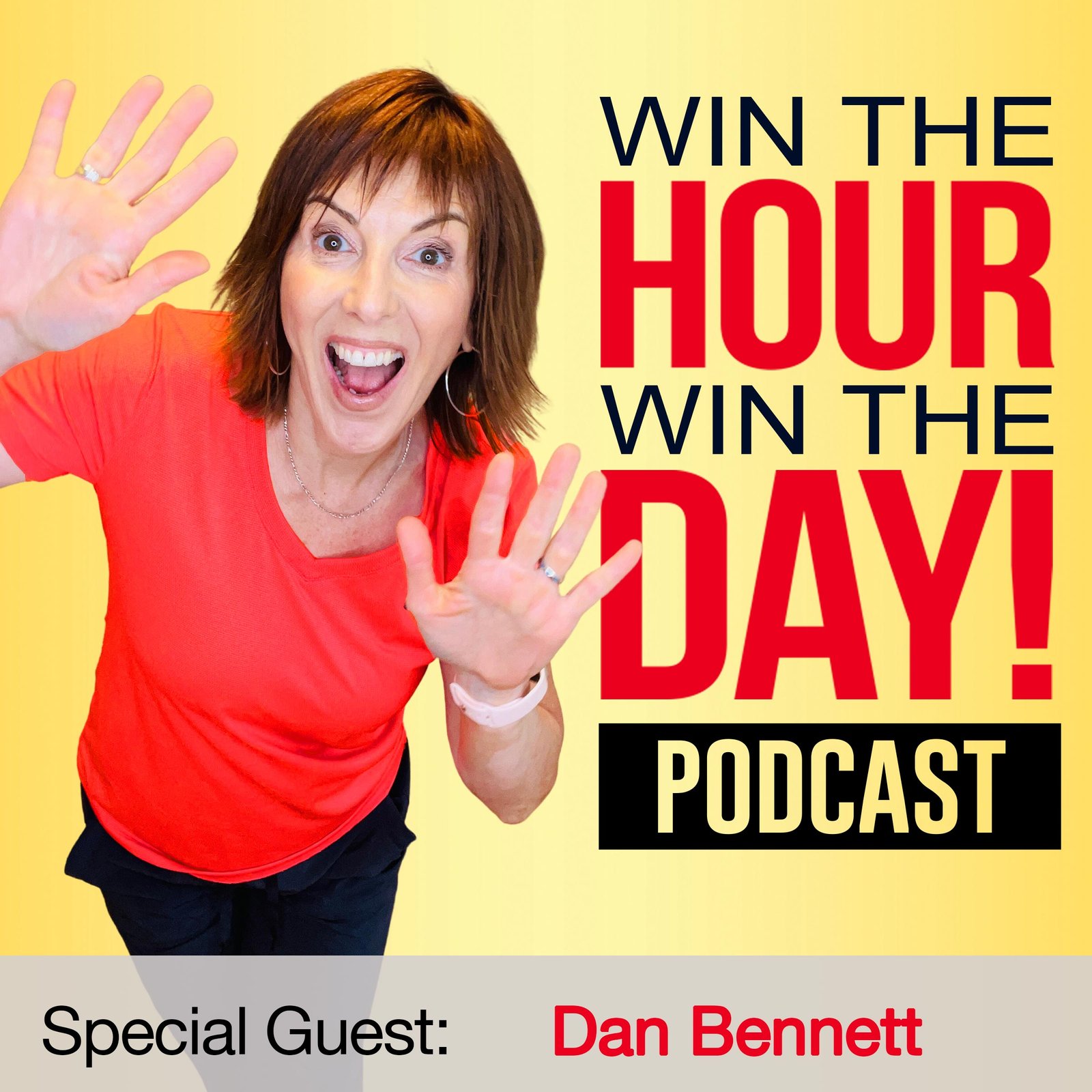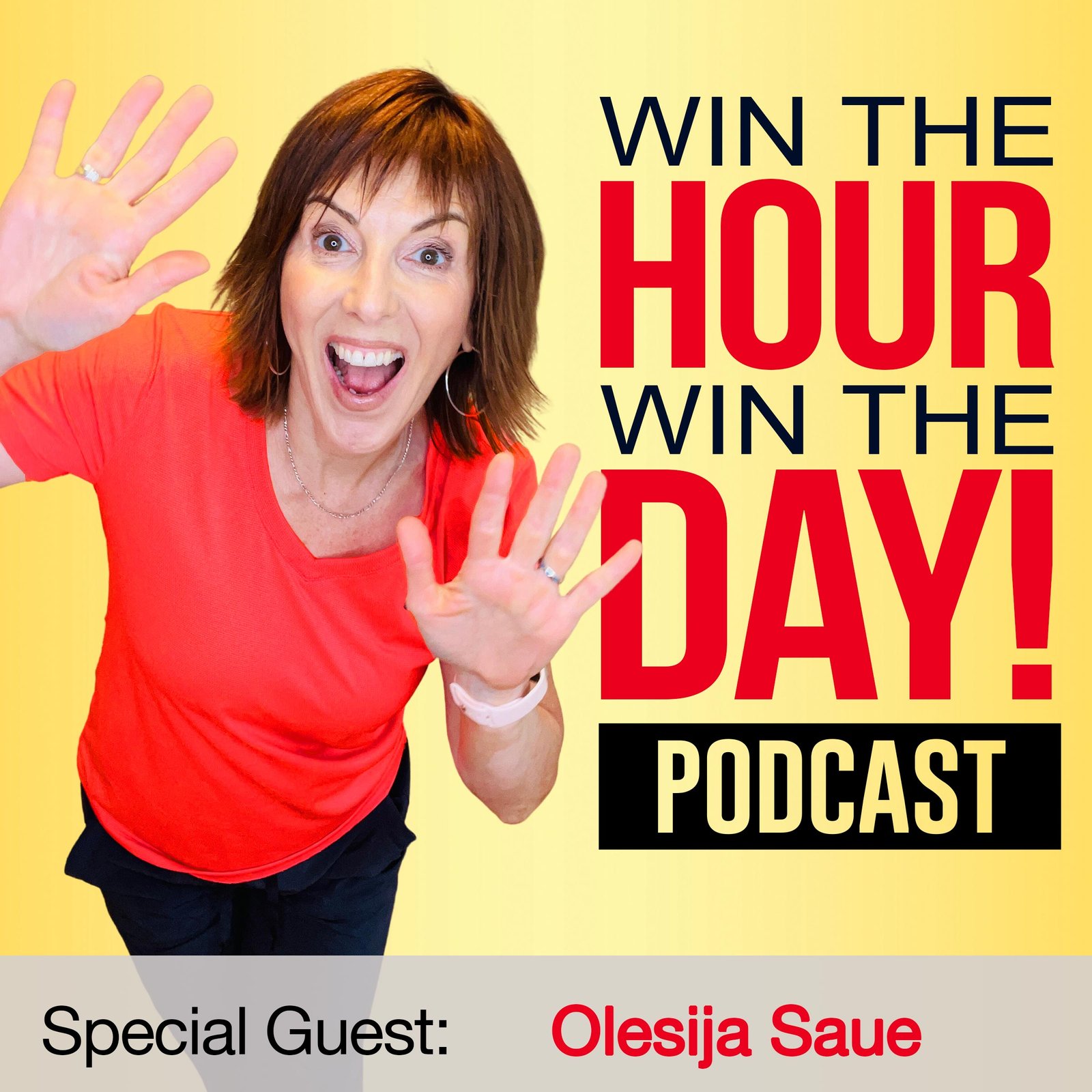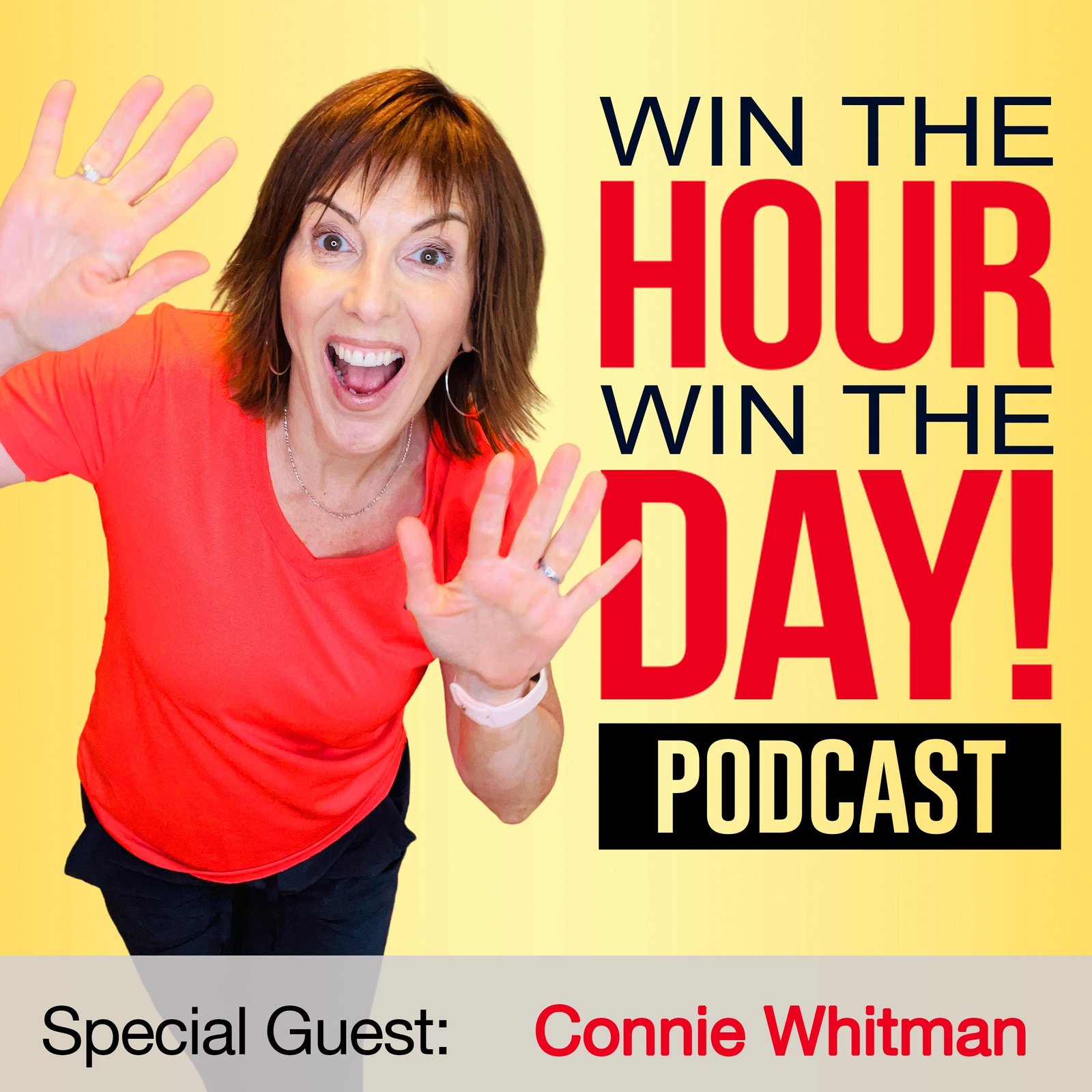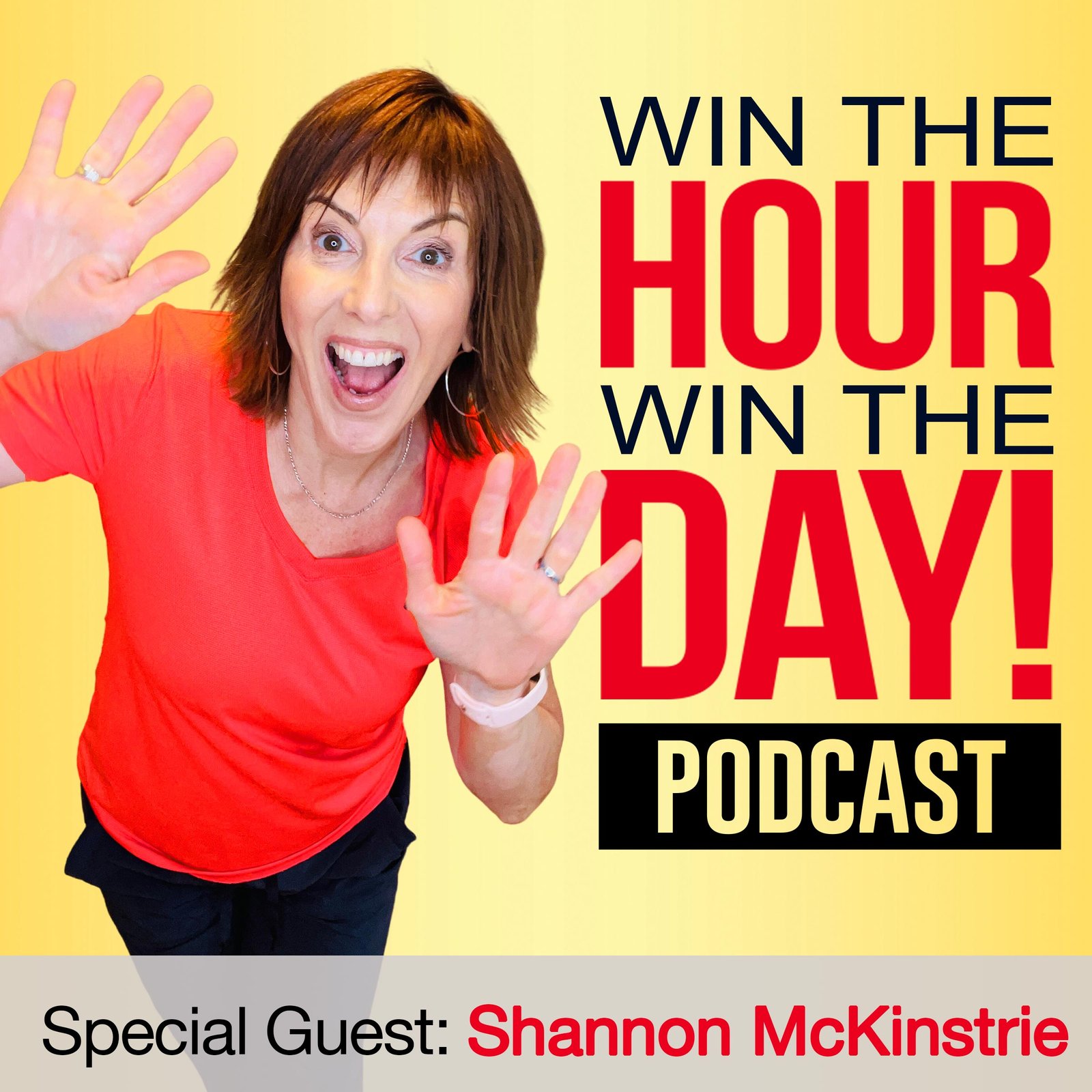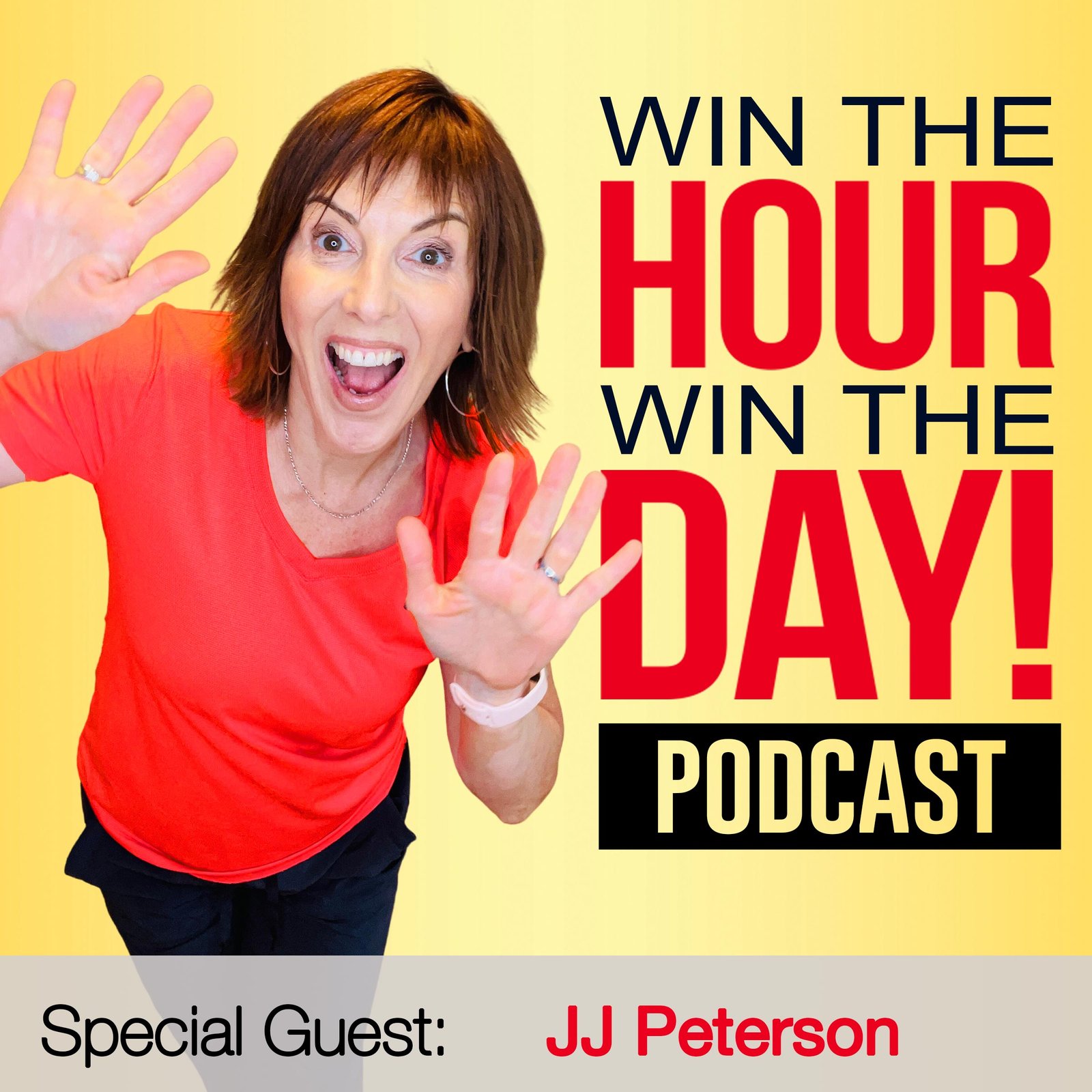Episode Summary This week’s episode of Win The Hour, Win The Day Podcast is...

Are You Ready For Your Next Big Win?
Know your entrepreneur personality and I’ll take it from there!
Recent Podcast Episodes
Preventing Burnout with Smart Work Tools! with Kris Ward
Episode Summary This week’s episode of Win The Hour, Win The Day Podcast is...
Master Social Selling: Heidi Medina’s Strategies for Engagement
Episode Summary This week’s episode of Win The Hour, Win The Day Podcast is...
Boost Productivity and Master Storytelling! with AmondaRose Igoe
Episode Summary This week’s episode of Win The Hour, Win The Day Podcast is...
Master Video Marketing: Top Tips for Entrepreneurs with Dan Bennett
Episode Summary This week’s episode of Win The Hour, Win The Day Podcast is...
Boost Your LinkedIn Strategy with AI Tools for Enhanced Productivity! with Joe Apfelbaum
Episode Summary This week’s episode of Win The Hour, Win The Day Podcast is...
Mastering Personal Branding with NLP Techniques! with Olesija Saue
Episode Summary This week’s episode of Win The Hour, Win The Day Podcast is...
Innovative Lead Generation and Email Automation Secrets with Jennie Wright
Episode Summary This week’s episode of Win The Hour, Win The Day Podcast is...
PR Strategies for Diverse Entrepreneurial Impact! with Jennifer Singh
Episode Summary This week’s episode of Win The Hour, Win The Day Podcast is...
Convert More Clients on LinkedIn with Richard Moore
Episode Summary This week’s episode of Win The Hour, Win The Day Podcast is...
Master Business Growth on Pinterest with Meagan Williamson
Episode Summary This week’s episode of Win The Hour, Win The Day Podcast is...
24/7 Sales Boost: Video Marketing Secrets with Alex Sheridan
Episode Summary This week’s episode of Win The Hour, Win The Day Podcast is...
Master Public Speaking Tips with Nausheen Chen!
Episode Summary This week’s episode of Win The Hour, Win The Day Podcast is...
Beating The Burnout With Connie Whitman’s Success Story
Episode Summary This week’s episode of Win The Hour, Win The Day Podcast interviews,...
Craft Your Social Media Content Strategy With Shannon McKinstrie
Episode Summary This week’s episode of Win The Hour, Win The Day Podcast is...
Boost Your Productivity with AI Tools: A Deep Dive with Erik Fisher
Episode Summary This week’s episode of Win The Hour, Win The Day Podcast is...
Boost Visibility: Repurpose Content and Leverage Podcasts With Christina Lenkowski
Episode Summary This week’s episode of Win The Hour, Win The Day Podcast is...
Master Personal Branding & Storytelling with Lisa McGuire
Episode Summary This week’s episode of Win The Hour, Win The Day Podcast is...
Boost Business on LinkedIn with Catherine B. Roy’s Strategies
Episode Summary This week’s episode of Win The Hour, Win The Day Podcast is...
Scale Your Business: Optimizing Virtual Assistant Services with Kris Ward & Rachel Eubanks
Episode Summary This week’s episode of Win The Hour, Win The Day Podcast is...
Affordable PR Mastery: Crystal Richard Unveils Modern Techniques
Episode Summary This week’s episode of Win The Hour, Win The Day Podcast is...
Mastering Business Storytelling with JJ Peterson’s Guide
Episode Summary This week’s episode of Win The Hour, Win The Day Podcast is...
Revamp Your About Page: Guide to Personal Branding
Episode Summary This week’s episode of Win The Hour, Win The Day Podcast is...
LinkedIn Mastery and Video Marketing Secrets with Alex Sheridan
Episode Summary This week’s episode of Win The Hour, Win The Day Podcast interviews,...
The Systems and Processes Playbook: Insider Secrets to Streamlining Your Small Business with Leah Abunales
Episode Summary This week’s episode of Win The Hour, Win The Day Podcast interviews,...
How To Brand Yourself And Really Find Your Voice! With Mike Kim
Episode Summary
Mike Kim is a sought after branding expert. He specialized in branding yourself and really finding your voice. He tells us how to sound like “you” in every touchpoint, especially when writing, texting, or posting! It’s a talent that few tap into or master. Mike shares his signature Personal Brand 3 and how it can frame every way you show up! It’s a wonderful tool to really connect with your audience in a powerful way!
Learn how to:
-effectively communicate from the heart
-stop sanitizing everything you say
-how to create a real following that really connects with you.
Join The Community: https://www.facebook.com/groups/WinTheHourWinTheDay/
Win The Hour, Win The Day! www.winthehourwintheday.com
Podcast: Win The Hour, Win The Day Podcast
Facebook: https://www.facebook.com/winthehourwintheday/
LinkedIn: https://www.linkedin.com/company/win-the-hour-win-the-day-podcast
You can find Mike Kim at:
His Podcast – The Brand You Podcast https://mikekim.com/brandyoupodcast/
On Instagram @mikekimtv https://www.instagram.com/mikekimtv/
To get your FREE GIFT from Mike Kim, visit:
Brand You Bootcamp: https://mikekim.com/bootcamp
Don’t miss out!! Get on our waiting list for The Outsourcing Playbook For Busy Entrepreneurs. More Results Less You! https://www.comingsoonfromkris.com/
MIKE KIM
Timestamps starts Kris (13:09):
Hey Everyone. It’s Kris Ward with Win the hour Win the day and today. Oh boy. Oh boy. I cannot wait to dive into this. This is going to be super fun and you’re going to hear stuff in a way you’ve never heard it before. In the house is Mike Kim. Mike Kim is a speaker and a marketing strategist who specializes in brand strategy and copywriting. He’s been hired by some of today’s most influential leader brands, including John Maxwell, Donald Miller, Susan Evans and catalyst for years. He was a chief marketing officer of a successful multimillion dollar company near New York city. Nowadays you’ll find him speaking at conferences, looking for the great place, a great place to scuba dive, sipping a glass of McCallion 15, all like teaching everyone he knows about branding, entrepreneurship and life through his podcast Brand You. Welcome very much, Mike, we are excited to have you.
Mike Kim (14:04):
Thank you very much. I’m excited to be here. And uh, we met, uh, at one of those conferences. I was traveling to you. So here, here we are a, it’s all full circle, right? So it’s awesome to be here.
Kris (14:16):
He’s very kind. He was a really amazing, impressive speecher this feature. Oh my gosh. Speaker. Okay, let’s start off. We’ll start off making me sound really good. Okay. Everyone calm down cause we’re excited that Mike’s here. So you were an amazing speaker and I attached myself to you really quickly before the crowd swarmed you. And I said I would love to have you on my podcast and uh, you gave me a polite nod but I persisted and here you are. So you touched on some major, really interesting points that I just wanted to sort of expand on a little bit more, but before we do that, why don’t you tell people a little bit about how you got into this or your journey in entrepreneurship so we get an idea of those who haven’t had the pleasure yet of knowing you.
Mike Kim (15:04):
Yeah. Um, so really what happened with me was I was the CMO at this company. It was that the, um, you know, head of marketing basically. And I knew as soon as I took the job, I didn’t want to be there forever. Uh, cause I, I like for me, career freedom was really, really important. Locational freedom was really important. And actually, uh, prior to taking that position, I had done quite a little bit of music and a public speaking. So when I took that job, I didn’t have that kind of outlet. So what I did just to kind of stave off that creative outlet, right to, to have a creative output outlet was it started blocking. And then I started podcasting. And as I did that and taught a little bit about what I was doing at work in marketing, it started to slowly attract a tribe, an audience, a grow, a reputation, and made some friends in that online space.
Mike Kim (15:58):
Several of them had hired me, they liked my work. So, you know, as sooner rather than later, I had a little bit of freelance work and it’s eventually got to a point where I, my tribe grew. Um, and I was able to make enough offerings and sales that I actually left that C-suite position altogether. And I went full time into running my business, both as a consultant, as a marketing strategist, and as an online educator, you know, an online course creator coach and I really niche down into the personal brand space. You’d mentioned some of the names that I’d worked with and I’m really fascinated by working to market people. I just, I just think it’s fascinating. I think that’s where a life has taken us and where it’s going to continue to take us. We are PR, we are brands. Believe it or not, you know, anyone who has a social media account, you are marketing yourself. You are a brand. And I’m deeper than that. I, I, I love helping market people, uh, because I truly believe Kris, I truly believe people should do work that they love and truly believe in. You know, work is such a big part of our lives. I have seldom met anyone who’s truly fulfilled in life that doesn’t like what they do for work. And so for that small sliver of the population who says, I want to create, I want to share my expertise, I want to profit from what I know, I want to help them because I know that they can really make an impact. Um, so that’s, that’s what I do.
Kris (17:36):
You know, I say that all the time and my platform and what I say is business should be fun. Like it’s, it’s meant to support your life, not consume it. And I really think business should be fun and I do love what I do very much. And it’s super, and the days just fly by when you love that. Now I’m all about what you say about personal branding and, and, and all that stuff. And that sounds so great on paper and, and marketing and all that stuff. But what I found really fascinating is the not just, again, you were just a such a impressive, you know, you gave such an impressive delivery of the content, but some things that you mentioned to a of the, one of the big ones too was when you’re starting to connect with people online or marketing, it’s not getting a sale. It’s opening a relationship. And I thought that was really a powerful takeaway for me. But one of the things that I really want to dive into a little bit more here too is really about, I’m all about being polite and getting out of there. So, but when you talked about that and how your copy should really be, you know, reflective of you and all that stuff, it really was an awakening for me. And I think most of us try to try to be safe. That’s the word you use. We try to be safe and it’s really, it’s really hurting us. Wouldn’t you agree?
Mike Kim (19:03):
Yeah, yeah. I think, um, well we, we all want, no one wants to temper their voice. We do it not because we want to be, um, necessarily. Uh, correct or tactful. We don’t, we just don’t want to be, we don’t want to be Jerry Maguire. You know, you remember that movie, you know, those of you who didn’t watch the movie, Tom cruise plays a sports agent and he has this epiphany one night about how the, the entire industry should be and what’s wrong with how they do things at his firm. And he’s really using his voice and he prints out this, you know, manifesto puts it on everyone’s desk and then he walks into work in the morning, everyone’s read it and they all give him a round of applause and he’s fired that day. And that’s, that’s what we’re afraid is going to happen to us. And sure that can happen if you work in a big company or something like that. But if you’re a personal brand and you are your business, like the goal here is to be authentically you. Um, and that word gets overused a lot authentic. That doesn’t mean transparent,
Mike Kim (20:12):
There’s a difference between being authentic and overly transparent. We don’t need to air our dirty laundry in front of, you know, there’s only a small amount of people, very small amount of people in our own individual lives who we can be transparent with. It doesn’t mean that we’re not authentic with everyone else. And what I mean by that is, I’m sorry, today work is hard. This is a struggle. I feel great. This is amazing. Just be true to yourself. And so much of the time we, we carry that kind of tempered voice into our marketing and communication and it really makes us sound like everybody else. And you are your best ad, you know, your personalities, your most of the unique selling proposition.
Kris (20:58):
And I think some of that comes in from education where you kind of like you, you know, your essays get watered down and there’s all this pre work you do before you put content out. So I know I’ve mentioned that a number of times here is, is you’re right, I think that word authentic is loosely used because I wasn’t being, you know, inauthentic. However, I was giving you professional and polite Chris, because I don’t know you that well online. I don’t want to offend you. I’m trying to be polite. I’m not going to disagree with you. Things come out wrong and copy and humor does not always translate well in text. Right. So, so then I realized it was very, you know, water down and you got to get out there and if you do try a little bit of humor and it falls flat on a few people then such as the loss I guess. So that was really when you talked about even your personality coming out in, in how you write and things like that. I really struggled with that for a long time. What do you think some of the biggest mistakes people are making? What do you see in those often in that arena?
Mike Kim (21:59):
Well, I think what I, what I often see is that people will copy other people’s writing, um, and try to emulate that voice because it’s someone that they, they admire, look up to and there’s a place for that, right? Like when, when a baby is learning to talk, you know, they’re imitating what their parents are saying, right? But eventually at some point they’ve got to become their own voice. And you know, for myself as a marketer, as a writer, a copy writer, there are a lot of resources out there that will teach people how to write. Here’s a script, here’s what you should say. And the temptation is feel like is to go to the other side and say, well, I should never script anything. I should never follow script any, anywhere at anytime, because that’s not really how I would talk. And that’s also wrong because if you’re, if you’re in business, these scripts are proven to work and 90% of what works for someone else could probably apply, be applied to what you do.
Mike Kim (23:02):
It’s that last 10% that makes you different. I call it the special snowflake writing, right? That’s, that’s what makes you sound different. And so, um, that’s the part that you’ve got to own. And if you can focus on getting the 90% down Pat, then you can devote your energy to that 10%. That does make you different stylistically [inaudible] tone. Uh, the length, the pacing at which you write, what your voice sounds like. And um, you know, it’s sorta like, it’s, it’s, it’s like Simba in the lion King was first trying to roar. You know, it’s a process. It’s a process. And, um, the worst thing think any of us could ever, ever really, really end up in is to create a prison of our own making. Because early on, especially in this line of work, you know, I’m going to go into business for myself. I’m going to make myself the business and then create a prison of our own making where we can’t actually be authentic. We can’t say what we want. We can’t, you know, it doesn’t mean that we’re crude or vulgar or this tasteful, it’s just we have an opinion and now we’ve completely relegated ourselves to sounding like every other company out there. And we created a prison of our own Mickey.
Kris (24:20):
And you know what? You’re so right. I find that so refreshing and others, but I often confuse that with being professional. Like even at the beginning of our talk here and I messed up and I called you a speecher, the old me would’ve been like, Oh my gosh, we got to start over like that. Like I, you know, I wasn’t doing you justice. I’m rambling cause I’m excited and I would’ve started that over and now I’m just like, okay, let the chips go where they may. And that was a real, that was something I had to really work on. And I know I appreciate, you know, whatever celebrities or people that we know, whatever that are really just in the moment and they’re a bright light and their flaws and all and it’s fun and that’s all well and good when it’s not you. But I think sometimes we get confused with the professional versus like, I know I talk quickly and people, I have a high energy, but I often for years would look at like Martin Luther King and I think, Oh my gosh, if I gave that speech, it’d be like I had a dream.
Kris (25:13):
This is what happened. And it would’ve been like, what would have been destroyed? So for many years I was trying to sound more grown up and more professional and think pace yourself. I even took two speaking courses on how to speak slower, which my husband had said I should have got my money back on both of them. But I think we get that confused with being professional. And that’s the difference where I really learned from you is no, no, that’s just being you and you can only contain that so much. And, and I think the last place so many of us, um, master making that really who we are is in the copy is in the writing. So where do you start? Where like what’s good grammar, bad grammar, or are you just being you?
Mike Kim (25:53):
I think, I think more than grammar because grammar is something that you can change and shift, but it’s really learning to communicate from your heart, from your core, from what you believe. And one of the things that I, I taught in that session and I, I teach, I use with literally every client I take on. And every course that I teach as a starting point is something I call the PB three, which is the personal brand three. And these are three simple questions. And if you could visualize a Venn diagram, you know, question one is what pisses you off. And I use that word pisses you, you know, pisses on purpose cause I want to get to the emotion that’s underneath. We sanitize everything. So what pisses you off is the injustice that you see in the world. That that word is also very strong.
Mike Kim (26:37):
The injustice that you see. And the second question is what breaks your heart? And that’s the compassion you have for people. And you can see these are feeling words, right? And then the third question is what is the big problem you’re trying to solve? And that’s your business. A business is nothing more than solving a problem for a profit, right? Right. So your, your message, your core message lies at the overlap of those three things. What pisses you off? What breaks your heart? What’s the big problem you’re trying to solve? And if you, if you can say that and communicate that from your core, then the words will just follow for example. Um, what, what takes me off with what got me into this line of work was actually, uh, Thanksgiving day 2013 my mom and sister came to my condo in New Jersey at this time I was working as the CFO of that company and I got a call and they said, you gotta come into work on Friday.
Mike Kim (27:28):
I was like, why would I come to work on Friday? It’s black Friday. And that really, Kris had really pissed me off. I’m not over exaggerating. It really pissed me off because I was already putting it 65 70 hours a week for, for this company. And I had stayed up till two in the morning hanging out with my mom and sister at my house and like we had just these amazing conversations and I thought to myself, I want to do more of this tomorrow. Why do I have to go into work? Like what is the actual point? And it really, really ticked me off for that. That was a cat that for me, that was a catalyst in my journey because I thought, God forbid, something that happened to me. So I’m having my family. Um, they’re sitting at home at my place. I’m not there.
Mike Kim (28:10):
I’m going to work. Yeah. And, um, what, what broke my heart, you know, as I, as I went through that kind of life experience was, you know, I had decided I’m gonna, I’m gonna make my way in and create something for myself here. I’m not just gonna let the powers that be control when I can work and when I can see my family and so on and so forth. But really what I started to find as I was continuing to grow my business and my brands, uh, while I was still working full time, was I saw all these other people. They were living a caged life. The, they weren’t happy at work. They were brilliant people. I worked with them. It was an educational company. These people were brilliant. And I was like, why don’t you start a blog? I just started one, why don’t you start a podcast?
Mike Kim (28:51):
And I could never do that. I was like, wait a second. You teach entire classrooms of high school kids. Of course you can start a podcast. And that really broke my heart to see that they just resigned themselves to a caged life. And so yeah. And then when you look at what’s the big problem I’m trying to solve with my business, it’s to help that small sliver of the population that does want to do something. Like what I do. I know I bring a unique set of skills to the table in marketing and copy and branding and I want to help them market themselves. And you’ll notice I didn’t say what pisses me off. Uh, you know, a bad advertisement really pisses me off. Ugly website breaks my heart. I didn’t say that. Now there are people who will say that and guess where they are.
Mike Kim (29:36):
They’re working at a global ad agency. They’re designing ads for Coke and McDonald’s and these should be, that’s where they are. But my particular story, you know, my business is not built around just marketing. It’s, there’s actually a deeper life mission. And if you can connect that to stories and experiences, then you have something to put teeth to. You have something to put your words in front of and behind to contextualize and you can communicate that in your own way. Right. So I might say this really pissed me off, but other people might say this was just this was intolerable and they might be very, very professional sounding. But you’re getting the point across. The point is people can tell when it comes from the core and that’s where I really start with the messaging.
Kris (30:28):
I think there’s a lot to unpack in there. And I know like when I said in the beginning, where does the grandma’s start and end? What I was really talking about is, is you know, learning how to write like you talk. Cause we all, when you write you write different than you speak. Right? So when I was seeing your samples and things that you were showing and you were giving different samples of the same sentence, I was realizing, wow, he’s really talking to us with his copy versus we all sit down and try to sound professional with our polished grammar. When you’re writing copy and I think you made another powerful point. I mean I could just follow you around all day and we flagged when you make really great points, it sanitizes you. And I know I was subject to that for years because I had this wall where here’s my professional self and then here’s, you know, more casual Chris.
Kris (31:15):
I mean there’s not a big gaping hole between the two. It’s not like I’m running a motorcycle gang on weekends, but I put the shoulders back and was a little bit more sanitize when I was representing myself professionally. And I think that really keeps hitting home with me. Your ability to talk about finding your voice and, and, and that is really the only like these are the people you want to connect with one on one. So if you have this sanitized voice online, not only will you miss that opportunity, but they’re not going to get the person they thought you were advertising anyhow. Right. So I think you tap into something that most people, when we’re talking about marketing copy don’t, that’s the difference. Like, so, yeah. So tell us more about that. What would you say is another big mistake that we all do that you see day in, day out?
Mike Kim (32:03):
Well, I think, I think to your point about, you know, this professional voice versus this other more casual voice. Another thing that I often see people fall into is thinking that they have to use the same voice across every platform. Right? And that that’s not true. And so if I can give another example, you know, I don’t have kids, but I have two young nephews, they’re four and two, and they’re absolutely adorable and absolutely demonic, you know? Right. And either at that age or they’re just like chaos. They’re the cute chaos. It’s crazy. And, um, you know, I’ll hear my sister say, we’re using our inside voice inside, not our voice. And I’d see that. And I’d be like, yeah, that’s that, that’s applicable here. You know, um, on channels that are more fun and casual, Instagram, tic talk, Instagram stories in particular, you can use a lot of emojis.
Mike Kim (32:56):
You can do silly things, have fun, colorful stuff. You’re not going to put any emojis in a book. Your publisher won’t let you, they don’t even have that typeface in the book. So by and large, when, when we say voice, like you’re going to use a slightly different voice depending on the medium that you’re using. Um, one of the things that I do on Instagram just to have some fun with myself and I break all the grammar rules and, um, you know, sometimes, and, and what I’ll do is I will write a, I will write, um, a caption in all lowercase with no punctuation and it’ll sound, it will look like, I sound like, Oh my gosh, there is no end to this core in teen life. Oh my gosh, someone killed me. Now. That’s what they hear when they read it like that. So you’re being somewhat social, right. Um, in that, in that regard, uh, like, like very, very like down to earth if you will in that regard on that. But I would never write a LinkedIn post like that.
Mike Kim (34:03):
Cause the audience on LinkedIn is a little bit different and it doesn’t mean I change who I am. I might, I might actually use punctuation if I wrote something like that. Right. Um, I might change the wording slightly to anyone else wondering when this is all going to end. Question Mark. Boom. And it’s the same spirits of what I’m trying to communicate. It’s just in a different context. Uh, and it’s just, and so you tailor the voice inside voice versus outside voice. Right. And we all do this, so yeah. My apologies. Go ahead. Yeah, no, we all do this in regular life. That’s my point. A white,
Kris (34:38):
Oh my God. Sorry.
Mike Kim (34:39):
No, no, no, no. It just doesn’t have to be any different when we write. So yeah, that’s my point.
Kris (34:43):
Talk quick. If you’re going to get in here. I am enjoying learning. Find my voice as I talk over somebody else. I so apologize. I all I was going to say is, it actually reminds me of another great point that I wrote down when I was learning from you in that seminar is, you know, you get stuck with the rules. So somebody says, okay, here’s how you write copy headlines and then boom, boom, boom. And then you, I believe it was the word fun, I think was your most opened email that you ever got. And I was like, Oh my gosh, I had, you know, all these rules and copy headlines and start with how to or do this. And, and I was like, well, I never thought of breaking all the rules and just experimenting. So that was another thing, like again, you found, you found and followed your voice and just threw it out there and saw what works for you. And clearly it worked.
Mike Kim (35:31):
Yeah. Yeah. You just learn and that’s part of getting more comfortable with your voice and, and the more comfortable you become, the more you experiment. Right. Um, you know, no kid, my, my nephews do not say like, I’m gonna, I’m gonna. Um, I’m gonna, you know, run an obstacle course before they learn how to walk or run. You know, as soon as you kind of get comfortable walking or running, then you can start jumping around playing sports, blah, blah, blah. And we, we see this progression is no different than our voice, you know? Um, and when you push yourself and not even really push yourself, but when you just allow yourself to be open to new possibilities, then your creativity kind of fills that gap. Uh, one of the things I do on Instagram from time to time is I will post a ridiculous looking selfie where I just look, you know, it just looks ridiculous.
Mike Kim (36:23):
And then I don’t even know what to say in the caption. And I will write in the caption, caption this please, and you can have a bunch of comments and it’s just, you know, when I first started out on Instagram years ago, I would’ve felt that is so self-aggrandizing. Look at me. I’m posting a selfie of a big problems posting. So I hate people who post selfies. Right. And then you just realize this is just the medium. It’s not good or bad. It’s like music. There’s no such thing as good music or evil music. It just music, it’s just pictures. It’s just, you know, so all things considered equal, the medium is the medium. Then you give yourself freedom to kind of experiment and play around with it and just keep it fun cause you own in the long run you only do stuff that you know, stays fun, you want to do. That’s what keeps you in the game. Cause it’s fun. So yeah,
Kris (37:15):
100% and it’s shocking at this point. You know, you’re a very young, young looking person, but I’m sure you’re past 20 I’ll give you like 2223 and we’re talking at this point really still about finding your voice. And I think that has changed so much. Like whether you are confident in your voice is one thing. But I think how we share our voice has changed so dramatically in the last five years. So it’s been like a reset for all of us. Trying to figure out how, like where do we start with that? That’s the really big problem I guess.
Mike Kim (37:47):
Yeah. And you know, in even as we’re talking, like right now we’re talking during this global pandemic, everyone’s locked down. Everyone is on social media. So there there’s a huge increase in the number of voices out there that are actually speaking of now. Right? And going back to the Jerry Maguire thing, I think this is actually a really good opportunity for you to speak your mind and not feel like it’s coming out of left field because everyone right now is raw like they are, they are being real right now. Like when, when when Saturday night live is shooting skits from people’s computers on, on zoom. This is clearly the great equalizer, right? This, this pandemic is this great equalizer. And so people are now speaking their mind. They’re being very honest. They’re being authentic, you know, in a sense, you know, they’re shooting videos in their bedrooms without all the fancy stuff and everyone just seems more relatable.
Mike Kim (38:50):
So you can use this time to come speak your mind. Do you see in the movie Jerry Maguire, this thing was, you know, he has this enlightened moment, writes this manifesto, boom, out of nowhere. And so there’s no lead up. There is no context for it. Everyone’s taken aback. And so they fired him. And right now the opposite is happening. Everyone is just speaking their mind. Everyone is being honest. Like, Oh, I don’t have toilet paper. Right? Like the stuff that you don’t normally say. And so I had advised people, I mean like I was on a call just recently with a, the founder and CEO of a major email marketing company. I mean billions of dollars in this company. Um, and he’s like, I don’t know what to say to our customers. I’m like, this is the opportunity. Just use, just rant if you need to vent, because they want to hear that, you know, leaders in this time, they used their voice, um, to bring clarity, not to add to the confusion.
Mike Kim (39:52):
They bring clarity. You can calm people down. You can rally people. It doesn’t mean you have to be quiet. You just have to bring clarity. And there’s only one way to bring clarity if you’re seeing something as a leader a certain way. Um, and when I say leader, I know that some people will, Mike, I’m not a leader. Uh, guess what, if you have clients, you have people who you influence, your leader leadership is just influence, right? And so you, you, I, I in that role, when I’m an advisor to a business or when someone’s asking me on a coaching call or a consulting call or whatnot, I have a certain degree of influence and I’m going to use that to lead them. Well, to clarify, and if I hold back from what I really think one of my clients should do, because I’m afraid that it’s going to be in a voice that’s too hard to like, I haven’t done my job right. So I actually view this as a very big, good opportunity for us to change our brand voice and actually speak more of what’s on our mind.
Kris (40:49):
That’s really powerful because I will admit something now that I wouldn’t have admitted before to you right now is cause it’s kind of controversial. I, I stay away from the news or it’s not there to cheer you up. And so I look at this somehow that this is like I’m a Rocky fan. Like, okay, getting there, doing pushups and when they turn the lights back on, you’re ready to go for the fight. So to me, I’m looking at this is, Oh, I’m just, I know it’s silly. I know there’s a lot and I’m not minimizing the suffering or unemployment or anything like that, but how I cope in my mind is I am going to come out of this bigger, better, faster, stronger, and that there will be, there’s always growth from everything, you know, whether it’s the environment, whatever. I think there’s a changing of the day and a changing of the guard.
Kris (41:33):
But I’m not talking about that. I would have never admitted that even here, except you keep saying this and I think lie of these things, I would never say out loud because it’s like, Oh, I don’t want to offend somebody who just lost her job. When I think, look through every, you know, a Falcon rises through all kinds of ashes and we don’t know the good that’s going to come out of this. We’re only focusing on the fear right now. And so, you know, that’s a big deal. I will tell you, I witness said that, but you kept saying all these things, I’m like, okay, here’s my thoughts.
Mike Kim (42:03):
Yeah. And what, and what’s going to happen is exactly what just happened here, right? Because I said that you felt like I can say that too. And as you said, people who follow you are gonna feel that way too. And um, and this is not to minimize this at all, but a really good example of this, even though it’s a very, very terrible subject, is when, when women speak up about harassment or abuse, it’s, as soon as one person says something, then it gives permission for everyone else to say, Oh yeah, me too. That happened as well. Right? Right. And you see, this does not just a recent political or politicized, you know, me too movement. This has happened through centuries and centuries of human history, of societal history. So when someone is willing to speak up first, it empowers everyone else to speak up as well.
Mike Kim (42:57):
And that is, you know, the leader, you, you, if you’re a pioneer, you get the most arrows shot at you, you know, you get stuck the most. But my God, you know, we, we need something. You know, I, I look at it, I look at life like this, you know, there’s, there’s basically three perspectives. You can be a historian, you can be a reporter or you can be a futurist. One looks at the past, the other looks at the presence and the the third, it looks into the future and figures out how to pull the future into the present. Right. And in times like this, that’s what we need. You talked about the news, they’re not these guys not saying anything new. I mean they’re making stuff up to fill the 24 news hour cycle. I’m just like, this is pointless. Then even if they found a, a vaccine or whatever, they’re not going to go live with it for another year, year and a half.
Mike Kim (43:52):
I’m not going to wake up anytime soon. Too. Miracle you’re as found is not going to go back. They’re competing with each other. Yeah. And then you go and YouTube and all of these videos like are being done now about the 1918 pandemic and what can we learn from the end? Just like I do not give two dimes about like, you know what I mean? Like tell me what the future’s gonna look like. Give me clarity. And so I can prepare for that and make the most of it. That’s who I want to listen to. And believe it or not, there are probably some people who want to, other people who want to listen to that too. So the choice is ours, historian, reporter, futurists, and there’s a place for all three, but know who you are and, and know who you’re listening to. You know you don’t need to watch the news five hours a day. You really don’t.
Kris (44:51):
No, I am skipping channels. Like even when they, somebody like even like if I see somebody shooting from home, like Rachel rage, she starts talking about the pen. Okay, skip that. I just keep moving. It’s just not, it’s not helpful to me right now. So I keep moving. Well this has been a real treat. I feel like I, I don’t know about the listeners but I’ve gone through business therapy here. So I’m finding my voice. I’m growing up right in front, right in front of your eyes. Look at me. I’m a big girl now so we know we can find you on Instagram and a man. We want to find you everywhere cause I think we would really learn a lot just by watching you do what you do. So tell us where people can find you.
Mike Kim (45:28):
Well, um, you guys are all listening to a podcast. So the easiest thing to do would just be hop over to my podcast. It’s called brand new and a, it’s all about helping people build a profitable personal brand business. Uh, Instagram is great. That’s my favorite social media channel. My handle is at Mike Kim. TV and, uh, I’ve actually just recently put together a three video series to help anyone who’s getting started in using their voice, getting the clarity as to, you know, what, what pisses them off, what breaks your heart, what’s the big problem you’re trying to solve? That’s actually the very first session and is completely free. It’s just three video session, um, which I call the brand you bootcamp. And you can go there@mikekim.com, forward slash bootcamp. Uh, th those sessions are actually taken from paid courses that I’ve created in the past and I wanted to make it available for anyone because we’re in this situation, I think, I think this is a time, Kris, where all of us should be sharing our gifts and that’s just something that I know that I can provide to people, especially who are like getting started and trying to find that voice, trying to step into that and it’s just available. So take advantage of it. It’s completely free. I don’t care if you’re listening a year from now, it’ll be free. It’ll be there. So dive in.
Kris (46:40):
Yeah. And I’ll make sure to put that in the show notes cause I’m telling you, I have seen him like, Oh, it’s just awesome if you get to, if he, especially if you let him talk, you don’t interrupt and talk over him. Chiasm the amount you can learn is frightening. So please, if something they know when they listen to the other shows, I’m not normally this bad. So thank you again for joining us. We super appreciate you fitting us into your schedule, your time and I cannot thank you enough. So thank you again.
Mike Kim (47:07):
It is an honor and a thank you for having me and all of you. Thank you for listening in and just keep your head up and we’re going to get through this and everything’s going to be all right. We’re going to come out of this stronger. Um, so just hang in there.
Timestamps ends Kris (47:20):
Awesome. Thanks.





